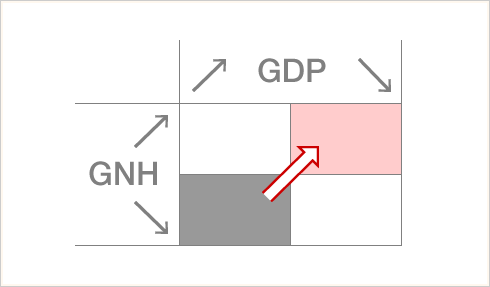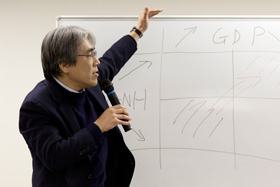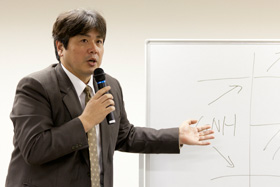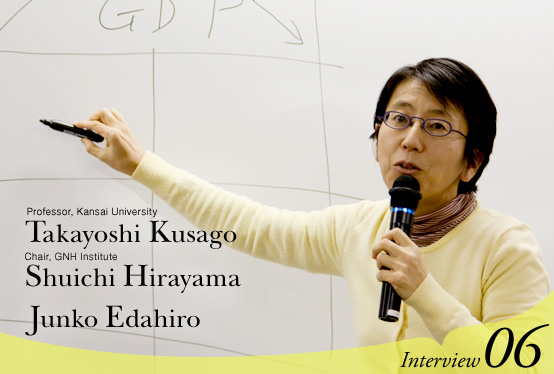- Edahiro :
- Thank you very much. In what you just said, there were two points I consider to be very important. The first is about the economy. Corporations do their corporate activities, we consume, and economic activity continues, there is economic development, and economic growth is measured by GDP. Even though each of these is really different, people tend to see them as if they are the same thing.
- Economic growth is defined as “the number of workers multiplied by the labor productivity growth,” and we already understand the growth of labor productivity from past experience. If the working population is going to gradually decrease, then economic growth will also decrease from here on. But even though the population declines, GDP per capita can still continue to increase.
- On this point, as a member of the Japanese government’s Fundamental Issues Subcommittee under the national Advisory Committee on Energy and Natural Resources, I have spoken about zero growth. But as soon as people hear I mention “zero growth,” I get a reaction to the effect that, “You will not move ahead unless you peddle the bicycle. If you stop pedaling, you will fall over.”
- But that is not true. The economy will continue to turn. Corporations will continue to compete, and new products will steadily be launched. These things will appear in each market. I think this is a very dynamic world. My point is that the total quantity cannot increase. In other words, this “zero growth” means “dynamic equilibrium.“
- Yes, we need to continue pedaling the bicycle. But when I ask, “Do we have to continue accelerating as we have done so far?” it is like asking, “Is it necessary to continue growing the GDP?” Perhaps this becomes confusing for people, to the point that if you raise questions about economic growth, the reaction is extreme. People ask me, “So you want to stop the economy?” I have experienced this response a lot lately. That’s my first point.
- Edahiro :
- Another point is about GDP and GNH. It seems people feel they have to choose just one, but the point is that we do not have to make a choice between one and the other.
- For example, if we picture a framework with the GDP and GNH within that, we can think about four scenarios: GDP increases. GDP decreases. GNH increases. GNH decreases (see figure).
- In a given society, GNH increases while GDP can also increase. Perhaps we feel that today the issue in Japan is that, “Maybe the GDP is trying to increase, but what about GNH, or happiness? These are not in good shape.” The worst case would be a society where GDP decreases and GNH also decreases, where capital is being lost and happiness is also declining
- Perhaps what we need to think about is how to get from this dark square to the red square (see figure). As I mentioned, if the working population declines, then GDP will absolutely decline. If each one of us were to try to increase productivity to roughly compensate for the decline in the working population, then the annual rate of growth per year would have to continue at 3 percent per capita. This is a thing of the past, only applying to a specific period during the economic bubble in Japan, but economic experts tell us this would be impossible to achieve.
- Some people have different ideas for when the working population declines, such as increasing the number of foreign workers in the country, or making better use of female workers. But a book titled Shrinking Population Economics: Lessons from Japan says that these would not solve the problem.
- This means we must accept a world with GDP starting to decline. So, unsurprisingly, in the near future the Japanese government is likely to change course from the use of GDP to GDP per capita as the measure of a variety of things in Japan. I suspect that at this moment, they are considering the timing. GDP per capita can continue to increase, so it is more attractive for use as a measure.
- Anyway, whatever happens, it is a given that GDP will decline. So in this context, the question is how to create a society where GNH does not decline, and where GNH can actually increase even if the scale of the economy itself shrinks. Maybe this is what we need to think about, more than anything else. Until now, the frame for discussion was a choice of either GDP or GNH. But I try to look at things this way. What do you think about all this?

- Kusago :
-

Thank you very much. This is a very easy image to understand, and as you say, it is not a choice between GDP and GNH. The question is really how we should deal with GDP.
- The wellbeing represented in the red square is something that demands discussion, about what is important in order to guarantee our quality of life. Of course, the economy is also important. But over and above that, for example, living in a community, and having good friends there, and the feeling of fulfillment of being able to live there, and having good work are also important. The question of whether you can measure the so-called wages for the kind of work that can be considered to offer good conditions. Those are the kinds of questions demanded by this box.
- So perhaps the most important point is this: “Is GDP actually the same as the economy?” Unless we somehow change this awareness, I don’t think people will truly comprehend that multidimensional wellbeing is important.
- But there is a tailwind, and we have it here in Japan too. The OECD and several countries are saying, “Just as we suspected, GDP is not enough. We can’t measure the progress of society just with that indicator.” So I think that we have an opportunity now, and we need to skillfully spread this message around the world.
- The next thing is to consider the concepts of Minamata's Tetsuro Yoshimoto (a former local government official, known for his work on regional revitalization), whom I respect. Yoshimoto speaks of three economies: the money economy, the collaborative economy, and the self-sufficiency economy. He says that the three economies need to be in good balance.
- So people ask, “Can we do that in our community?” Especially in Tokyo, that’s also what I wonder. It might be impossible in just one community or region. But how about also making linkages between rural and urban areas, and linking regions with other regions. These are some of the things we have to change.
- The potential for getting there is not zero. That's what I think.
- Hirayama :
-

I agree. If you depict things that way, they are very easy to understand. It is exactly as Ms. Edahiro says. Elements that can increase GNH but cannot be measured by GDP, for example, could be collaboration, trust, and the diversity of relationships. Furthermore, with regard to food, it's about whether or not people have security. There is also that kind of thing.
Also, in society overall, there are food banks and other frameworks to use things effectively where there are surpluses and to avoid waste. For example, food that has passed the “best-before” date. With just a little bit of reflection, people can provide some security. And they do not require monetary exchange. Anyway, I think we can see where this could go.
- Edahiro :
- Thank you very much. For example, the OECD, Japan, and others today are starting to move toward creating indicators other than GDP, and as Mr. Kusago said, the progress of society cannot be measured by GDP alone. Something else is needed. Such an admission is something very novel for Japan.
- Until now, we were not thinking about the real progress of society, only about the progress of the economy. Perhaps the thinking was that the economy is society, or that society is contained within the economy. Perhaps this was the image: if the economy grows, then the well-being of society will go along with it. So to think seriously about the very progress of society itself is something quite new for Japan, I believe, but the OECD and European countries have already gotten here, along a different path, in the past.







